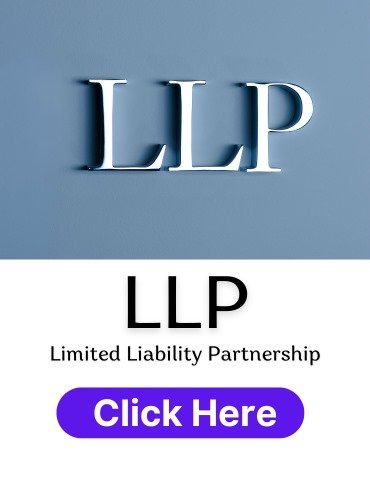Limited Liability Partnership
Original price was: ₹15,000.00.₹8,000.00Current price is: ₹8,000.00.
Incorporation+ 2 DSC+ Form 3
All Government Fees Paid By Client
Documents Required:
- KYC
- Contact Details
- Address Proof
- Business Name
*18% GST applicable*
*For better experience & guidance we recommend you to talk with our experts*
Description
Limited Liability Partnership
A Limited Liability Partnership (LLP) is a distinct legal entity that combines the features of a traditional partnership with the benefits of limited liability, offering a flexible and advantageous business structure for various professionals and businesses.
Here’s some 10 key information about LLPs:
1. Formation:- Limited Liability Partnership LLPs are formed by two or more individuals or entities who agree to establish and operate a business together. The formation process involves registering the LLP with the appropriate government authority, typically the Registrar of Companies (ROC) or a similar regulatory body.
2. Limited Liability:- Limited Liability Partnership One of the primary advantages of an LLP is that it provides limited liability protection to its partners. This means that partners are not personally liable for the debts, obligations, or liabilities of the LLP beyond their contribution to the partnership. Personal assets of partners are shielded from business losses and legal claims.
3. Flexibility:- LLPs offer flexibility in terms of management and operation. Partners have the freedom to structure the internal management and governance of the LLP based on the terms outlined in the LLP agreement. This agreement typically outlines the rights, duties, and responsibilities of each partner, as well as the profit-sharing arrangement.
4. Separate Legal Entity:- Limited Liability Partnership Like a corporation, an LLP is considered a separate legal entity distinct from its partners. It can own property, enter into contracts, sue or be sued in its own name, and conduct business activities independently.
5. Taxation:- Limited Liability Partnership LLPs are taxed as a separate legal entity, similar to corporations. However, LLPs enjoy certain tax benefits, such as the pass-through taxation feature, where profits and losses are passed through to the partners and taxed at their individual tax rates. This can result in potential tax savings for partners.
6. Professional Services:- LLPs are commonly used by professionals such as lawyers, accountants, architects, consultants, and healthcare professionals who wish to operate in a partnership structure while limiting personal liability exposure.
7. Compliance Requirements:- LLPs are subject to certain regulatory requirements, including filing annual returns, maintaining proper accounting records, and adhering to statutory obligations as per the LLP Act, 2008.
8. Perpetual Succession:- LLPs enjoy perpetual succession, meaning the death, retirement, or insolvency of a partner does not affect the continuity of the LLP. The LLP continues to exist, ensuring stability and continuity of business operations.
9. Limited Regulatory Burden:- Limited Liability Partnership Compared to corporations, LLPs generally have fewer regulatory compliance requirements and administrative formalities, making them an attractive option for small and medium-sized businesses.
10. Liability of Partners:- While partners in an LLP have limited liability, they may still be held personally liable for their own wrongful acts or misconduct. However, they are not held liable for the actions of other partners or the LLP itself, except in cases of fraud or negligence.
Conclusion:-
In summary, a Limited Liability Partnership (LLP) offers a balance of limited liability protection and operational flexibility, making it a popular choice for various professionals and businesses seeking to mitigate personal liability risks while enjoying the benefits of a partnership structure.
10 FAQs About Limited Liability Partnership (LLP)
1. What is a Limited Liability Partnership (LLP)?
A Limited Liability Partnership (LLP) is a unique business structure that combines the features of a partnership with the benefits of limited liability for its partners.
2. Who can form an LLP?
An LLP can be formed by two or more individuals or entities intending to carry on a business or profession. These individuals can be residents or non-residents of the country where the LLP is formed.
3. What is limited liability in an LLP?
Limited liability means that the partners of an LLP are not personally liable for the debts and obligations of the business. Their liability is limited to the extent of their contribution to the LLP.
4. What are the advantages of forming an LLP?
Some advantages of forming an LLP include limited liability protection, flexibility in management and operation, tax benefits, perpetual succession, and reduced regulatory compliance burden compared to corporations.
5. How is an LLP taxed?
LLPs are taxed as a separate legal entity, but they enjoy pass-through taxation, where profits and losses are passed through to the partners and taxed at their individual tax rates.
6. What are the compliance requirements for LLPs?
LLPs are required to fulfill certain regulatory obligations such as filing annual returns, maintaining proper accounting records, and adhering to statutory requirements as per the LLP Act, 2008.
7. Can professionals like lawyers or accountants form an LLP?
Yes, LLPs are commonly used by professionals such as lawyers, accountants, architects, consultants, and healthcare professionals to structure their businesses while limiting personal liability exposure.
8. Can an LLP have perpetual succession?
Yes, LLPs enjoy perpetual succession, meaning the death, retirement, or insolvency of a partner does not affect the continuity of the LLP. The LLP continues to exist as a separate legal entity.
9. What happens if a partner commits wrongdoing in an LLP?
While partners in an LLP have limited liability, they may still be held personally liable for their own wrongful acts or misconduct. However, they are not held liable for the actions of other partners or the LLP itself, except in cases of fraud or negligence.
10. Can an LLP be converted into another business structure?
Yes, subject to certain conditions and regulatory approvals, an LLP can be converted into another business structure such as a private limited company or a partnership firm, or vice versa.
PROCES FOR WORK
- Documentation
- Verification
- Work Started
- Client Confirmation
- Client Confirmation
- Modification and Confirmation
- Application Filed
- Government Approval / Tax payment
- Work Completed
- Pending For Payment
- All Document shared to Client On Mail and WhatsApp
Sources : https://cleartax.in/s/limited-liability-partnership-registration-procedure-india
For More Information : https://taxgyany.com/product/limited-liability-partnership/





Reviews
There are no reviews yet.